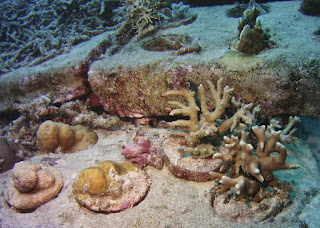 |
The step
reefs with coral biscuits to repair sloping coral reefs
were built by the Kalapuan community as part of the TRACC SGP/GEF project |
The community of Kalapuan island has been building our complex step reefs during 2014. Made of cement mortar with two rows of bottles, the back row of bottles is taller than the front. The undersurface during manufacture or the top surface after positioning has indentations which correpond exactly with the shape and size of our coral biscuits in the nursery.
 |
| The step
reefs with coral biscuits have a variety of coral species to increase diversity of the repaired coral reefs. |
 |
| Millipora coral spreading from the coral biscuit across the step reef. |
 |
| Pocillopora coral growing from a fragment in a biscuit into a healthy coral supported by a step reef |
 |
| Porites coral has completely overgrown the original biscuit |
 |
| Porites coral has completely covered the original biscuit |
